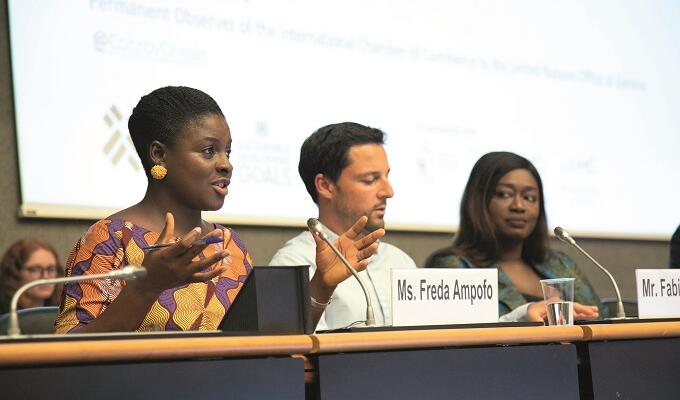

Bridging the MSME financing gap for sustainable development
Three strategic approaches to support micro, small and medium-sized enterprises
In the Ghanaian Akan language, the phrase ‘kaeme’ (pronounced /’kai.me/) means ‘forget me not.’ It embodies the feeling I wanted each Kaeme product to evoke when I started the company in May 2016. What started as a delightful hobby for me evolved into a business venture I could never have seen coming, one whose potential for growth continues to amaze me. For over a decade before, I had been making and gifting my own skincare products, made with love from wholesome Ghanaian ingredients. They were distinct from other commercial offerings because of their improved textures and scent profiles; these handcrafted cosmetics were not like anything available on the local or international market.
I started Kaeme much like many entrepreneurial ventures: with a burning passion to solve a problem, make an impact and improve the status quo. Within a few months of operation, it was clear we could achieve these objectives as a sustainable, indigenous Ghanaian business. However, in order for any start-up to scale up profitably, it requires a healthy balance of not only visionary leadership and effective strategy but also of adequate funding. Some 41% of micro, small and medium-sized enterprises (MSMEs) in developing countries have unmet financing needs worth approximately $5 trillion and women-owned businesses like mine make up 32% of these financing needs, the SME Finance Forum has said.
Bridging financing gaps has proven to be Kaeme’s biggest challenge, yet our experience has led to valuable, first-hand perspective on how funding can be made more accessible to growing businesses. Here are three key insights I would like to share with anyone willing to support MSMEs.
Access to affordable credit enables MSMEs to invest in machinery and equipment, purchase production inputs in bulk and at competitive prices, and to acquire the resources to attract the best talent. However, even when such credit is available MSMEs are often restricted by an endless list of requirements.
Many start-ups are bogged down by application formalities that do not recognize the fledgling nature of their operations. In our quest for additional funding, we have come across two particular prohibitive conditions: exorbitantly high interest rates and collateral conditions the company simply cannot meet. We have discovered there is a dearth of finance products tailored for MSMEs, perhaps owing to the fact that banks and investors do not seem to fully comprehend the many challenges MSMEs face.
Our growth and expansion thus far have solely relied on the prudent application of personal savings and business income to fund capital investment, raw material purchases, business development and operating costs. Although we have encountered several enthusiastic venture capital firms, they seem more eager to sponsor our growing success on inequitable terms than to give us the needed foundation to thrive in the long term.
It is important for MSMEs to be weighed beyond tangible assets and understood beyond income projections. There is a critical communication gap that must be overcome by entrepreneurs and investors to ensure partnerships that are more fruitful. Although many MSMEs are engaged in viable business, they lack the luxury of additional manpower (such as a company accountant) and the technology to generate the information required by standard credit applications. It is important to offer a more flexible approach that allows MSMEs to obtain the needed funding without ploughing through a mountain of paperwork with no guarantee of success, thereby compromising on the time needed to focus on their core business. Financial support to MSMEs must also be cost-effective and ideally complemented by financial advisory services to lay a solid framework for increased lending in the future to support further expansion.
The average MSME has limited resources to devote to marketing and creating a brand presence beyond its immediate sales territory. As helpful as local trade shows and exhibitions are, they often lack enough pull to attract investors and larger potential business partners. The solution could be creating diverse opportunities for MSMEs to project their goods and services and secure an audience with companies and agencies that can positively influence their businesses.
I represented Kaeme at this year’s ITC MSME Day, which gave me the chance to share our unique story and highlight the peculiar challenges we share in common with other MSMEs. The discussions and engagements during the event were not only insightful to participants but also allowed MSMEs like Kaeme to create awareness of the real issues they face in building sustainable businesses while sharing their success stories.
Such platforms offer budding MSMEs the credibility to vault their local markets onto an international stage. They are crucial to fostering mutually beneficial connections between MSMEs and impact investors, development agencies such as the ITC, and allied services such as logistics and transnational trade certification agencies.
In line with our commitment to United Nations Sustainable Development Goals 1 (No Poverty), 5 (Gender Equality) and 8 (Decent Work and Economic Growth), Kaeme sources its raw materials from a women’s co-operative in Ghana. This eliminates middlemen and ensures that the hardworking women who produce these raw materials receive a fair price for their labour.
We also offer career-building internships to high school and undergraduates and retail our products via a network of female entrepreneurs to give broader expression to our sustainable business ethos. Still, there is so much more we could do with larger corporations whose mission and values align with ours and we continually seek such partnerships to multiply our efforts.
Small businesses like mine account for more than 80% of the jobs created in developing countries, the International Finance Corporation estimates. Creating opportunities for MSMEs in emerging markets consequently has the potential to improve economic development and reduce poverty through better livelihoods.
MSMEs are a vital connection to everyday people: we make numerous personal connections along our value chain. Imbedded in these interactions is the potential to affect significant positive change. Fostering collaborations between MSMEs and relevant stakeholders is a crucial way to implement global goals on a more direct local scale that benefits many people who might otherwise be overlooked.
I look forward to seeing MSMEs like Kaeme go beyond national and regional recognition to compete in new global territories, nurtured by a supportive community of trade agencies, finance corporations and venture capitalists. That way we can make monumental strides in building stronger businesses to achieve more inclusive economic development.



